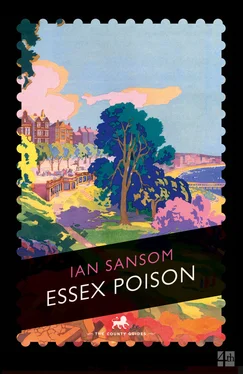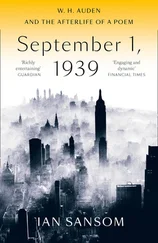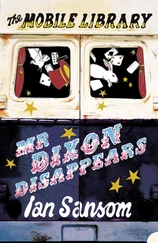
CHAPTER 7
THIS IS ENGLAND
AS SO OFTEN, with so many people, and so many things, what Willy actually had to show us was something of an anticlimax. What he had to show us was a building site on Klein’s new development on the edge of Becontree. He was shouting facts and figures at us, vainly trying to impress Miriam, as lorries went thundering past.
‘You see, apart from the construction,’ he yelled, ‘there’s all the haulage and the materials themselves. So in the average house you’ve got perhaps forty thousand bricks, plus your lime and sand and cement, and then there’s your plaster and roofing tiles, fireplaces and what have you. Which is about a hundred and fifty tonnes worth per house, which has all got to be hauled to site somehow – plus your excavations. So you’re looking at quite a job.’
‘And quite a profit,’ said Miriam.
‘Exactly,’ said Willy.
‘So Mr Klein builds the houses, he provides the materials, and he provides the means by which the materials are transported? Is that right?’ said Miriam.
‘That’s right.’
‘Quite a business model.’
‘I didn’t know he was into haulage as well,’ I said.
‘Indeed he is, Sefton,’ said Willy, as a lorry nudged its way slowly through the building site towards us.
‘Quite the all-rounder, your Mr Klein,’ said Miriam.
‘You could say that. He was rather hoping in fact that Sefton here might be able to assist us with one or two of our current projects.’
‘Sefton!?’ Miriam laughed.
‘Yes.’
‘Assisting your Mr Klein?’
‘Yes.’
‘Has he met him?’
‘Thank you for that vote of encouragement, Miriam,’ I said.
‘Well anyway, he’s too late, isn’t he, your chap,’ said Miriam. ‘Sefton’s already in steady employment – working for me.’
‘And I’m sure you work him pretty hard,’ said Willy.
‘You have no idea,’ said Miriam.
I wondered how much Mr Klein might be paying.
The lorry was now reversing its way perilously close to the Lagonda.
‘There we are,’ said Willy. ‘That’s what I like to see. Another lorryload down from the quarries.’ And as if on cue, the lorry upended its vast load of sand, close enough to the Lagonda to coat it in a fine pale yellow mist.
‘Little bit close for comfort,’ said Willy. ‘Sorry about that.’
‘Lovely lorry,’ said Miriam, taking no notice of Willy: she never really cared about the things that other people cared about. I thought for a moment she’d said ‘lovely lolly’.
‘A Thornycroft Trusty,’ she continued. ‘The lorry.’
‘How on earth do you …’ began Willy. ‘This is quite a girl you have here, Sefton.’
Miriam was quite a girl, but she certainly wouldn’t thank Willy for telling her so.
‘Father’s a great admirer of Thornycrofts,’ she said. ‘He has a little Handy that he runs on the estate.’
‘Really?’ I said.
‘Who’s your father?’ asked Willy. ‘Not that it’s any of my business.’
‘Swanton Morley,’ said Miriam. ‘Not that it’s any of your business.’
‘The People’s Professor?’
‘The very man.’
‘Good stock then,’ said Willy, as if appraising a prize cow. ‘I am impressed by your choice, Sefton.’
‘Might I refer you to my earlier answer about being “with” Sefton only in the strict sense of being accompanied by him, sir. He has no more “chosen” me than he has chosen the weather. I am an entirely separate entity.’
‘An entirely separate and unpredictable entity,’ I added.
‘Thank you, Sefton,’ said Miriam. ‘I’ll take that as a compliment.’
‘Anyway,’ said Willy, interrupting Miriam’s teasing, ‘this is the finished article.’ He pointed to a large plain, pebble-dashed building to our left. It looked rather … municipal.
‘It’s certainly spacious,’ said Miriam.
‘It’s maisonettes, actually,’ said Willy.
‘Oh,’ said Miriam. ‘I thought you meant the whole building.’
‘No, no! That’s a dozen flats there, miss,’ said Willy.
‘How continental,’ said Miriam.
‘They’re very well appointed inside,’ said Willy.
‘I’m sure they are.’
‘Perhaps we’ll make a house call, shall we?’ said Willy. ‘See it for ourselves? Come on.’
‘We should really be getting on, Willy,’ I said.
‘Nonsense,’ said Miriam. ‘Bit of colour for the book, eh, Sefton? Some photographs? Also, some material for my new column.’
‘You’re not a journalist, are you?’ asked Willy, suddenly alarmed.
‘No, no, silly!’ said Miriam. ‘I just write about my life for a woman’s magazine.’
‘Talents that know no end,’ said Willy, who was clearly smitten, as so many before and after were smitten.
We picked our way amid piles of sand and gravel and pallets containing bricks and long white wooden A-frames and beams and trusses and Willy rapped officiously on the door of one of the ground-floor maisonettes in the pebble-dashed building. A climbing rose had been rather forlornly planted by the door, nailed and tied with string to some sort of frame made from scavenged wood.
A woman answered almost immediately, wearing a pinny and a sharp expression. Willy explained that he was a representative of the firm that was building the maisonettes and wanted to show some visitors round.
‘Good!’ said the woman.
‘Excellent,’ said Willy.
‘I’ve been waiting for you.’
‘So,’ continued Willy, walking straight past her into the narrow hallway, indicating for us to follow. There was just room for the four of us to stand shoulder to shoulder.
‘I’ve written to you three times,’ said the woman. ‘And I’ve spoken to your foreman goodness knows how many. Where have you been?’
‘As you can see,’ said Willy, opening a narrow door to a tiny bathroom to the right. ‘All the houses come with indoor sanitary facilities.’
‘Well, well,’ said Miriam. ‘How marvellous.’
‘It doesn’t flush,’ said the woman. ‘It’s not worked for months. We’re having to slop it out.’
‘Oh dear,’ said Miriam.
‘Have you brought your tools?’ continued the woman. ‘Are you going to fix it now?’
‘I’m sorry,’ said Willy. ‘I represent the builders rather than the landlords, madam, I’m afraid,’ said Willy. ‘I thought I explained.’
‘We need this fixed,’ said the woman.
‘And I’m sure it will be fixed,’ said Willy. ‘If you don’t mind?’ He leaned past the woman and tapped a wall. ‘Solid brick construction throughout, as you can hear.’ The wall gave a hollow echo in response. ‘Homes for heroes!’
‘It’s all partition,’ said the woman. ‘No insulation. Walls are like paper. Look, the other problem is this damp in the bedroom. There’s mushrooms growing in here!’ She started to walk into the room leading directly off the hall, but Willy turned right instead and we followed into what was the one and only reception room, just big enough for a tiny square table on a rag rug on the lino floor, and an old iron fold-up bed concertinaed under the window. ‘And a fireplace in every room,’ continued Willy, gesturing towards the tiny brown-tiled hearth.
‘Gives no heat,’ said the woman. ‘We all have to sleep in here together in the winter, for the warmth.’
‘You’ve got electric lights, I see,’ said Miriam, gesturing at the bare bulb dangling over the table.
‘Doesn’t work half the time.’
‘Kitchen,’ said Willy, gesturing towards a room leading off the reception room, which accommodated a Baby Belling, a sink, a few shelves, and nothing else.
Читать дальше













